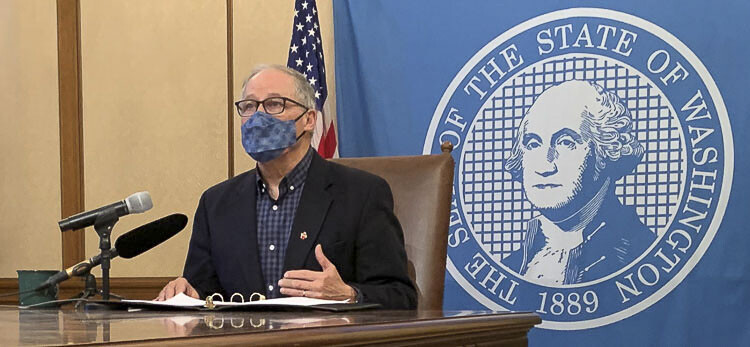
Gov. Jay Inslee’s $70.4 billion budget proposal assumes $1.4 billion in revenue from the capital gains income tax that lawmakers passed and the governor signed into law in 2021
Brett Davis
The Center Square Washington
The majority party’s top budget writer in the Washington State Senate can’t say if the state’s 2023-25 operating budget will include anticipated revenue from a new capital gains income tax currently in legal limbo.
“I don’t know the answer to that right now,” Sen. Christine Rolfes, D-Bainbridge Island, told “Inside Olympia” host Austin Jenkins during a Thursday appearance on the TVW program. “Ideally we’d get an answer from the Supreme Court before April, but we can’t count on that.”
The chair of the Senate Ways & Means Committee continued, “And how we decide to budget, I don’t know if we’ll do what the governor did, or hold some back. I don’t know the answer.”
Gov. Jay Inslee’s $70.4 billion budget proposal, which he released last month, assumes $1.4 billion in revenue from the capital gains income tax that lawmakers passed and the governor signed into law in 2021.
Targeting the state’s wealthiest residents, the measure adds a 7% tax on capital gains above $250,000 a year, such as profits from stocks or business sales.
That is, assuming the tax passes constitutional muster with the Washington State Supreme Court.
On March 1, 2022, Douglas County Superior Court Judge Brian Huber ruled the tax was “properly characterized as an income tax…rather than as an excise tax as argued by the State” and struck it down. The state constitution’s uniformity clause does not allow income to be taxed at different rates.
Huber said the tax “is declared unconstitutional and invalid, and therefore, is void and inoperable as a matter of law.”
Washington Attorney General Bob Ferguson asked the state Supreme Court to take up the case on direct appeal. This past summer, Washington’s highest court agreed to do so.
In November 2022, the Supreme Court stayed the lower court’s order, allowing the state Department of Revenue to administer and collect the tax in the meantime.
That has resulted in a situation in which the Supreme Court will hear oral arguments in the case on Jan. 26, with the tax going into effect on Jan. 28, per the DOR.
The ranking Republican on the Senate Ways & Means Committee, appearing on the same “Inside Olympia” program, was skeptical of counting on revenue from the disputed tax.
“It probably won’t be decided before the end of the year when we have the budget done,” Sen. Lynda Wilson, R-Vancouver, said. “It is $1.4 billion that he is banking on, and it’s already been declared unconstitutional by a superior court judge.”
She pointed out that counting on revenue from the tax could cause problems down the road if the Supreme Court rules against the tax.
“I’m a little surprised that they went ahead and banked on that $1.4 billion, because if it does come back after the budget, then we’ll have a hole in the budget,” Wilson observed. “And then what happens, right? Where do we get the funding if everything else has been spent? It’ll then give them an open door toward maybe tax increases.”
At least one Democratic legislator thinks it’s a bad idea to assume revenue from the tax, indicating doing so could imperil the state’s financial standing.
“I’ll just say, in the last few years Washington has earned a AAA bond rating, and to have earned that rating because of fiscal responsibility of making sure that we have a rainy day fund, making sure that we are spending wisely,” Sen. Manka Dhingra, D-Redmond, said at a Jan. 6 legislative preview hosted by Seattle City Club.
It’s not prudent to depend on something that has yet to happen, she indicated.
“I know it’s out there,” the Senate deputy majority leader said of the tax, “but I don’t think you can rely on it until you have it.”
This report was first published by The Center Square Washington.
Also read:
- The Study of Sports Podcast, May 8, 2025: Girls flag football is coming to Washington high schools, but how do administrators start a new sport?Reporter Paul Valencia and sports administrators Tony Liberatore and Cale Piland discuss local sports first, and we have fun with other topics, too, including news about a famous burger restaurant coming to Vancouver
- Stephen Davis brings his message of unity with Turning Point USA presentation in VancouverStephen Davis of Turning Point USA visited Vancouver to share a message of unity and faith with students and families.
- Cardinals elect American pope to lead Catholic churchRobert Francis Prevost becomes the first American elected pope, taking the name Leo XIV following a fourth-round conclave vote.
- Camas Police arrest robbery suspectCamas Police arrested a 19-year-old Vancouver man following a reported armed robbery early Thursday morning.
- CCSO deputy involved in deadly force incidentA CCSO deputy reported fatally stabbing a DUI suspect during an altercation at the Ridgefield WSP Scale House.
- Opinion: Revolution or revival?Nancy Churchill argues that Washington state is ground zero for a Marxist-style revolution but says a cultural revival is possible through personal responsibility and the America First movement.
- WA governor pressed to veto $1.8B piece of Democrats’ tax billGrocers and restaurateurs are urging Gov. Ferguson to veto a surcharge in HB 2081 that they say will raise food prices statewide.











